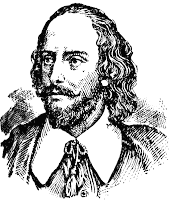William Shakespeare
William
Shakespeare a.k.a The Bard is known simply as the greatest playwright ever. But
Shakespeare has also made very important contributions in the fields of acting
and English literature.
William
Shakespeare is considered to be a playwright, poet and actor par excellence.
Shakespeare's works have been interpreted over the ages by different people
differently. Shakespeare's works have given rise to countless movie plots and
sub slots. The Bard as he is better known as, has also contributed to our
lexicon by adding phrases such as "in the limelight".
Shakespeare's
history is very controversial because there is a certain school of thought that
says that he was not a very ethical person. Stories of Shakespeare plagiaring
works of other playwright and passing them off as his own abound. Most of the
knowledge of his life comes from registrar records, court records, wills,
marriage certificates and his tombstone.
William was via third child of
John and Mary Shakespeare born, some time in late April 1564 in
Stratford-upon-Avon. The first two were daughters and William was himself
followed by Gilbert who died in 1612 and Richard who died in 1613. Of William's
seven siblings, only Judith and four of his brothers survived to adulthood.
How many Plays did Shakespeare Write?
William Shakespeare is known as
the 'father of English literature' who wrote more than 37 plays, 154 sonnets, 2
narrative poems and two "lost plays". First Folio published his 36
plays except 'cardenio' and 'Love's Labour's Won' (that were supposed to be
lost) in 1623. Lets have a glance over the plays he composed.
"A tale
told by an idiot, full of sound and fury, signifying nothing." - A line
from William Shakespeare's Macbeth, from Act 5, Scene 5
William
Shakespeare (1564 to 1616), the world's pre-eminent dramatist created an
extensive source that has been strikingly popular in English Literature right
from Queen Elizabeth I up to present Post modernism times. He not only wrote
plays but also appeared as an actor on the stage calle 'Globe Theatre' in the
Southwark district of London. Shakespeare wrote thirty-seven plays including 10
historical plays, 17 comedies and 10 tragedies. His two plays collaborated with
John Fletcher in the early nineteenth century were Cardenio and The Two Noble
Kinsmen lost in theatre fire. Some other plays Pericles and Prince of Tyre were
not noticed in that era. Therefore it was not published by First Folio and was
unavailable to readers. But some claim that still we have the original source
of lost plays translated by Thomas Shelton in 1612.
Most Popular Plays by William Shakespeare
The most famous plays are
considered to be Hamlet; which everyone fondly remembers on account of the
quote, "To be or not to be? That is the question".; and Romeo and
Juliet (1595) by Shakespeare based on the initial poem 'The Tragical Historye
of Romeus and Juliet" by Arthur Brook in 1562. 'A pair of star-crossed
lovers' is famous phrase from the play.
Julius Caesar
(1599), is a play about a political conflict where Caesar is warned to
"Beware the ides of March." This reflects on the idea of ancient
Roman assassination of Julius in public on the fifteenth day of March. 'Antony
and Cleopatra' (1623) unveils love and lust based on Thomas North's Plutarch's
Life of Markus Antonius. Most of the critics blame him of creating hero from
aristocratic families that seemed false as depicted in, The Merchan of Venice.'
Four Dark Tragedies
Othello (1603), displays the
clear picture of jealousy of Iago which caused the sad demise of relationship
between the couple Othello and Desdemona. The historical plays like Macbetg
(1603-1606) is the tragedy of wrong judgement in the hands of Lady Macbeth
while Hamlet (1599-1601) is the tragedy of the prince of Denmark who coined
terms like Oedipus complex. King Lear (1603-1606) is the story of a king who
divided his kingdom between his two daughters and left the loved youngest
daughter Cordelia in straitened circumstance and victimized due to a tragic
misapprehension.
Comedies by William Shakespeare (17)
- All's Well that Ends Well (1601-08), the title comes from the proverb means problems do not matter ao long as the outcome is good. It is called 'a problem play' neither comedy nor tragedy.
- As you like it (1599-1600), pastoral comedy based on Thomas Lodge's novel Rosalynde is famous for the oft-quoted monolog by Jaques,
"All the world's a stage And all the men and women merely players; They have their exits and their entrances, And one man in his time plays many parts, His acts being seven ages."
- The comedy of Errors (1589-1594) is about mistaken identities between two sets of twins in Ephesus. It proved to be a classical play covering opera, musical theatre and even stage.
- Much Ado About Nothing (1600) is the romantic comedy of two couples Hero- Claudio and Benedick and Beatrice. The title indicates that a great fuss about Hero's infidelity ("much ado") is ("nothing") but only a meaningless doubt.
- The Tempest (1601-11) Neoclassical play mingled with three unities of time, place and manner.
- Measure for Measure (1603-04) is based on the theme, "some rise by sin, and some by virtue fall." revolted with goverment, humiliation, truth and justice.
- Love's Labor Lost (1509's) means to do good to one's enemy.
Many of the
critics called William Shakespeare as 'a crock' for stealing material from
other sources. In reality his literary creations became the unique work amalgam
and they truly have a mesmerizing effect on people even today !


nice post gan , salam blogwalking
ReplyDeleteSalam blogwalking juga..
Deletenice posting
ReplyDeleteThank's gan :)
Delete